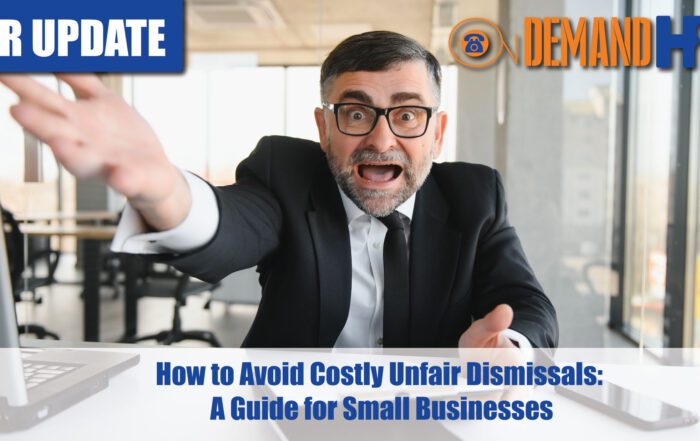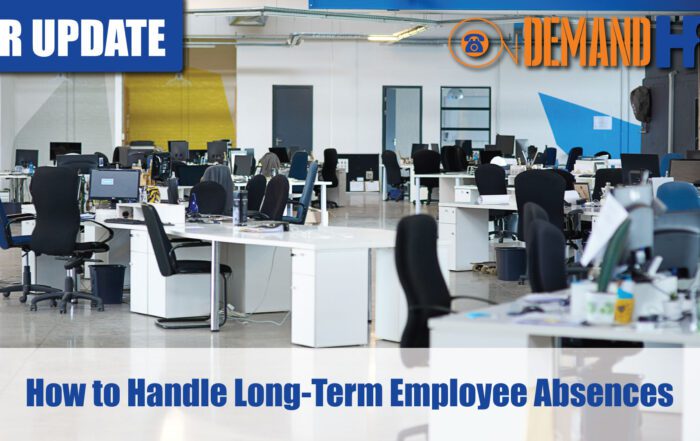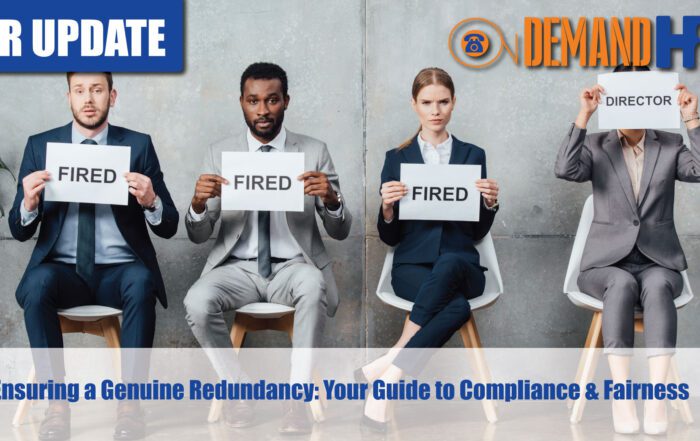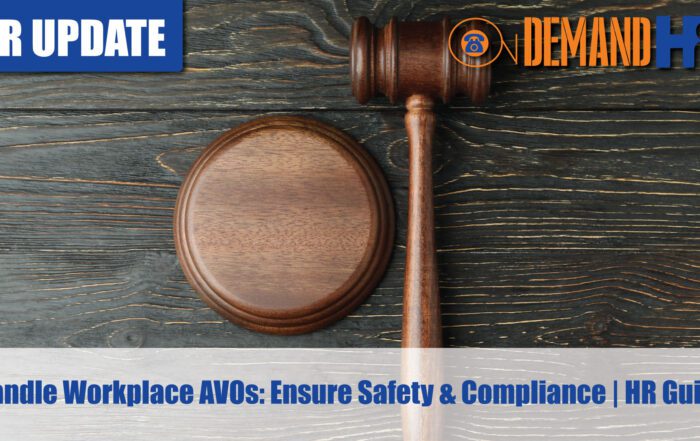NSW Workers Compensation – Major Challenges for Employers
This replay of On Demand HR’s first webinar session for 2021 where we will unpack some of the major problems with the NSW Workers Compensation system, why it is so often unfair for employers, the financial and legal risks, and the general challenges that employers in NSW are facing.
Most significantly in the past 20 years, claims costs for workers compensation have tripled in adjusted terms, with the average mental health claim now costing employers 20 weeks of lost time wages on average.
During this session, we offer some practical insights on how employers can best navigate their way through the difficult environment administered by iCare, and the claims management “monopoly” that currently exists for small to medium employers. Unfortunately, many employers still think that workers compensation operates like other “insurances”, but the harsh reality is that it simply doesn’t.
In this webinar we cover:
- Problems with the NSW workers compensation system, and why you need help
- Why should businesses be more conscious about managing their workers compensation claims?
- What sort of claims should you dispute?
- When should you start disputing claims?
- How to manage the key stakeholders in the process.
Please see below for a full transcript of the video
Share the HR or workplace relations challenge facing your business and one of our experienced consultants will be in touch within 24 hours with a strategic action plan or discover the best strategy yourself by accessing out free online training library.
Transcript
0:00
Look, without further ado, I think we might, we might get started actually. So for those who don’t know me, my name is Clint Indrle. I’m the Managing Director of On Demand HR. Today’s presentation is about New South Wales workers compensation. So we’re here today to really talk about some of the challenges you’re likely to face in workers comp, some of the challenges that we are seeing clients having on a regular basis. And and really just trying to bring more awareness to business about exactly what workers comp means. Trying to I guess, eliminate some of the naivety that businesses have around workers comp, thinking that it’s just insurance that and it’ll operate like any other type of insurance, which is just simply not the case. So we’ll go through that bit by bit today.
So today’s presentation is going to focus on, obviously New South Wales, because it’s state based legislation in workers comp. So we may look at running other sessions for different states and different schemes. But if you look at the National Workplace Relations system, most of our system is federal, with the exception of workers compensation, long service leave, there may be a few other small things that might be still state based, but workers comp certainly one of those areas that’s state based.
We’re going to talk today about problems with the New South Wales worker’s comp system, and why you should seek assistance on many claims. Why should businesses be more conscious about managing their claims? What sort of claims should you dispute? When should you start disputing claims, and how to manage key stakeholders in the process, and we’ll talk about exactly who those key stakeholders are. So as I said, before the presentation, please ask any questions as we go through today’s session as you please.
So I want to start with a couple of statistics on workers comp. And some of these are surprising, and some of them not so surprising. First and foremost, we can see here in terms of the frequency rates of what they call serious claims. So basically, we have on one side of the graph, we have here, the frequency, rate, and we have the number of hours worked in billion hours that have worked. So essentially, what we have here is we have the hours that people are working going up, the frequency of serious injuries are going down serious claims being defined as one with one with one week compensation or more. total hours, it seems total serious claims is decreased. So that’s interesting. Essentially, we’re seeing that the frequency going down and the hours going up.
This slide, however, is very interesting. And this is the this is the cost of claims. So what we’re seeing is that the gross median claim cost has nearly tripled. Over the past 20 years, it’s nearly doubled in adjusted terms. So what we’re seeing is, as I said, despite there being a lower number of claims, we’re actually seeing that the cost of these claims is going up quite substantially. So that is essentially the bottom line for businesses in worrying about their workers comp claims, particularly businesses that have those premiums of more than $30,000 a year that are employer rated or experience rated, and are obviously sensitive premiums are sensitive to claims. And we’ll get onto that a little bit further in today’s presentation.
But this next slide that I’m about to show you is the most alarming one that I want to talk about today. And this talks about the number of working weeks lost by the nature of injury or disease. So we look at a number of different ones of these they’ve been fairly, some of them have been fairly stable. So you look at you know, injuries to your nerves and spinal cord, you see that sort of, you know, up, down and then up again, but not, you know, nothing earth shattering in terms of changes from 2017 to 2000. We see, you know, muscular-skeleto quite simple, quite similar, a number of those other ones in the top list in the top list being not that different from what they were. And the big one that I take out of this particular graph I’ve highlighted in yellow for you is the mental health condition so that back in 2000, we saw the median time lost in working weeks being 11. And we’re now seeing that as being out almost 21. So we’re seeing double the amount of time off for mental health conditions. And look, you’re hear mental health talked about a lot in this presentation, because this for me is probably the biggest development and the biggest area of concern when it comes to workers comp claims in New South Wales and the types and frequency of these claims that we’re getting with clients.
To put it in context. So 21 weeks of time off for someone who is earning $1,000 a week. That would be a claim of approximately $21,000 for a mental health claim, on average and obviously that goes up with income and all of these sorts of things.
So I want to talk about some of the problems with with the system. And what I see is the real issues in workers comp in New South Wales. So first and foremost, ICare is the only insurance provider accessible to most businesses. Yes, there are some, some situations where businesses are large, they have different choice of claims providers. There is some situations where businesses are self insured, but for the most part, most SMEs, obviously obtaining their insurance through ICare, and EML, being the only claims provider to SMEs in New South Wales at present. So we may see a change to this in the near future. And certainly, if that happens, we will certainly be in touch with you about you know what that means and how you should take advantage of that. But I think that what I take out of that, in particular is that this whole concept of the monopoly that we have, has led to very poor outcomes for employers. So the bottom line is that EML and ICare in my experience of dealing with them over the past two to three years, they’re generally very risk averse to any challenging any claims. And in my view, there’s a very clear employee bias in the results.
And and the problem for businesses is they’ve got simply nowhere to go. So in a normal insurance situation, you might have choices of policies or different things that you can do to, you know, get a better result. And, and other types of insurance, you’ve got claims managers, you know, working against other claims managers to deliver competition in a particular industry, which may deliver better results in a particular type of insurance. Unfortunately, that that competition, or that healthy competition that we have, is completely absent when it comes to workers compensation at the moment. So businesses have got nowhere to go EML & ICare, not interested in you know, challenging any claims, clear employee bias in results. The problem is, the serious thing about this is that the employers are wearing all of the legal and financial risk associated with these sorts of decisions. And the system doesn’t simply operate like true insurance, the insurer is not working for you, the employer, I mean, and they have nothing really to gain from disputing claims either. So that’s something that we’re seeing that’s really problematic.
The other big problem with the system is that the nominated treating doctor rules, the process. And the biggest problem with this is that they’re usually conflicted by a long history with the patient. And and essentially employers can get any certificate they want. So you’ve got, for example, you know, Joe Bloggs, who’s got this injury. And you know, in order to certify that injury, all he has to do is go to his nominated treating doctor that he’s seen for the past 20 years that he’s got a close relationship with, he goes in for a very, very short consultation says these are the problems I have the diagnosis or level of diagnosis that the doctor is undertaking, at that particular point or level of analysis that they are undertaking that particular point is very, very basic. And it’s pretty much just a certificate for whatever it is that the employee certifies now look for a normal day off sick or something like that, you know, that’s kind of palatable, I suppose for employers, but when you’ve got a situation where that certificate is leading to 10s of 1000s of dollars of, you know, medical expenses and 10s of 1000s of dollars, potentially in wages, that will impact on the employers premium and effectively will be paid for by the employer. You know, in a number of cases, that is a serious concern, and that the nominating treating doctor seems to rule this process for a very, very long time. Yes, there is the ability for independent medicals to come in to come into play later on. But typically at that point that the claim is already very well established. And normally, you’re approaching some time in the claim before those processes can even kick in. So again, it goes back to the nominated treating doctor having the most power in this process, in terms of what they certify. And, and again, that can be very, very conflicted, because, as I just mentioned, that really not doing very much due diligence at all, before issuing Certificate of capacity, there’s a there’s a disconnect between diagnosis and cause. And the first certificate that’s issued by the nominated treating doctor normally leads to many other certificates being issued down the line.
And most, most GP’s, quite frankly, if I can be honest, I mean, obviously, we have a lot of, you know, intelligent doctors, but a lot of them don’t seem to be intelligent enough to fill out the certificate of capacity properly. And and this is a real frustrating thing that we see with clients where, you know, an employee will be certified fit for suitable duties, for example, but then the restrictions are extremely vague, and it could be something like, Well, you know, can’t lift more than certain type of weights or, or, you know, there might be something about can’t stand for more than this amount of time or can’t sit for more than this amount of time or, you know, there’s some there’s something not clear about the certificate, that then leads to a frustration about the return to work.
So, you know, even when there is capacity for the person to resume some sort of suitable duties, often the certificate of capacity itself is not clear on this and then you know, it’s kind of then incumbent on the employer to wear to either wait then for the next certificate, or try and come up with a return to work based on information, which is just incomplete. So that’s very difficult for employers as well.
Obviously, employers with over $30,000 in premiums will have their premiums adjusted for claims, as we will say, time and time again during this presentation. So something to be very wary of, for those employees in particular.
So what claims should you dispute? So my view is that there’s two main types of claims, I think you would dispute. First of all suspicious physical injuries. I’d say this is probably the minority. But ones where there’s a question mark on did the incident actually happen at work? Number two, was there a past medical history that we are aware of where the employee may have injured themselves in a similar body area in the past? What do we know about that? Do we have any certified information that’s been provided on that in the past, so that that can be often something that we might consider disputing. Another one that comes up from time to time with suspicious physical injuries is does the employee have another job?
So sometimes what we have is employees who take on, obviously employment with the host, the main employer, and then we have them either undertaking other employment either kind of on or off the books. So there might be a situation where, yes, they have a very clear, you know, wages and earnings with another employer. But I can tell you now, in many, many occupations, particularly with a terrible tax system, we’ve got that many employees will go off to secondary employment and try and seek out cash payments for those sorts of things. And that to think that that doesn’t happen is a very naive, and and we do see cases where employees become injured, that may be as a result of a second job, that again, that second job may not necessarily be formalized in any particular way. And there may there may be no trace of it. So that’s, that can be very challenging as well.
The main types of claims, I think, are worth challenging are these psychological claims, and we’re just seeing so many of them now, we’re either seeing injuries turn into psychological claims, or we’re just seeing flat out psychological claims straightaway. And unfortunately, these are being used as a weapon by employees to often commence workers comp as a as a basis for avoiding things that are happening in the work environment, if they are underperforming, if they are being disciplined, or if things are happening, you know, in their work life that is simply not to their liking.
Now, the workers compensation system is supposed to protect employers for taking reasonable management actions. So section 11A of the Workers Compensation Act in New South Wales is supposed to prevent employees from taking psychological claims, if the basis for their psychological claim is that they were transferred, demoted, promoted, it was something as a result of a performance appraisal, disciplinary action, retrenchment, dismissal, or provision of employee benefits to workers. So So theoretically, all of those categories of things are things that are exempt.
The problem is that the reality of how this is being enforced, again, by the ICares and the EML’s of the world is very different from what what should be happening in theory. And to take a recent example I had with a with a client, they had a situation where an employee had a physical injury turned into a psychological injury, very, very suspicious circumstances. In the medical certificate, there was four grounds for undertaking the claim. And that was they didn’t receive a promotion, and that they were they got a performance appraisal they weren’t happy with now on face value, you’d think, yeah, section 11A this is an exemption, this should be struck out. The problem is that along with those two things, the employee came up with some frivolous arguments about well, you know, I can, I also had some issues with other employees, a couple of people said some nasty things to me and so on. And even though, you know, it seemed to us there was some clear, the clear motivation for the complaint was the first two things, it seems like that the other issues played a part in in ultimately, how the claim was assessed and ultimately accepted.
So again, another disappointing outcome for a client and we just see these disappointing outcomes time and time again, and that’s why it’s really taken some time to come up with some good strategies to really work on improving and getting better claims outcomes for employers. And again, I’ll go back to what I said before these claims in your workers compensation premiums could costing you 10s of 1000s of dollars. So just important to keep remembering the 10s of 1000s of dollars of costs in having these claims, just simply rolling along with liability being accepted and it really is in your interests to try and bring about results in these matters as soon as you can and and to the best of your ability.
So when should you start disputing claims? and what I say to you all today, and if there’s one thing to take out today is that if you are going to dispute claims, make sure that you do it absolutely straight away, because it’s no good to simply sit back, provide some loose information to, you know, EML via their portal in the commencement of this, but then have a situation where you’re trying to, you know, dispute liability later on down the track. And if you do that, you’re already going to be, you know, far down the path of provisional liability being accepted that running for some weeks, but until it until that may be overturned.
So what we would suggest is that as soon as you get a claim that you think should be disputed, dispute it straight away. And you will need to be very strong on how you dispute it. Because as I said, it does almost take an electric shock for these, for these guys at EML to actually try and deliver an outcome, which is, you know, employer favorable. So doing it with via the email portal, as soon as the notification notification of the claim is given no later than seven days, as this is a timeframe of determining provisional liability. So if you don’t put anything forward compelling in the first seven days, and when I say compelling, very, very compelling, then provisional liability will be accepted.
I mean, we have many situations where we put forward something compelling, and provisional liability is still accepted. So there is some particular tricks which I won’t get into today, there is some other ways we can have provisional liability or try and push for provisional liability to be reasonably excused. But anyway, we won’t focus on them today. But yeah, certainly early action is important.
So the information that’s provided initially, obviously, the claims manager EML make the decision there. Most claims will be accepted on a provisional basis. So again, what you put forward, it needs to be very, very compelling. Once it’s provisionally accepted. I mean, the clock’s ticking from an employer perspective, the costs start racking up and yes, you’re getting reimbursed in theory, but in practical, your your premiums, taking a massive hit, if you’re above that $30,000 threshold, General experiences, you know, once a claim has been provisionally accepted, very, very difficult for it to be overturned. Even when, you know, all of this stuff about the factual investigation is promised, what we find a lot with clients is the way that they sort of shut up the employer, so to speak, is to say, oh we’re accepting provisional liability, because, you know, we don’t want to affect the possibility of returning to work, don’t worry, it will be factually investigated. And then what ends up happening is that the factual investigation really doesn’t change anything in terms of the status of liability. So that’s why the need to act early is very, very important. And as I said, you need to think of this process as you really need to advocate for your position, rather than trying to trust the claims managers, or as I said, the EML ICare model to do the right thing to start disputing claims.
Let’s just talk about some of the stakeholders in the claims process. So there is a few so you’ve got here the the factual investigator, so look, the factual investigator, the first thing that they do is they generally go out and interview all the relevant parties. And I would say to you this is that don’t think of the factual investigator as someone who’s going to go out and interrogate the employee, on the circumstances, if you think they’re suspicious, it is a very, I would call soft investigation process. Certainly, the manner in which a factual investigator speaks with an employee or any person providing evidence in a factual investigation. It’s very, very, it’s very, it’s a very soft process. It’s very cooperative. It’s basically just asking questions, which leads to the construct of a statement, ultimately, and, and, and it’s something that the person can review afterwards. It’s not like the same sort of investigation process that we would undertake in, let’s say, a workplace discrimination complaint or bullying complaint or something like that. So a employer instigated investigation on a complaint is much different from a factual investigator. That’s instigated by the insurer, ultimately and the claims managers. So as I said, it’s a very soft process, but choosing providers can be a factor in how good that process is. And we certainly have preferences on that which we can talk with clients about, you know, should they wish us to assist in these particular matters.
The rehab provider is also quite important. So the rehab provider if they are engaged, they are responsible for administering the return to work plan. And a good one can assist with questioning and revising the diagnosis and reviewing the diagnosis of the nominated treating doctor. Again, just allowing, you know, the claims managers to appoint anyone to do this is not necessarily in your interests, what you try, what you want to have is, is someone who’s a strong rehab provider. Again, we’ve got preferences of who we’d like to use for the rehab provider process, because otherwise, you’ll simply get who you’re given. And, you know, there may not be any push for, for any kind of return to work in any timely manner. So, again, trying to trying to be able to have conversations with the factual investigator in the rehab provider prior to their processes happening is important, the best way to do that is to be very careful about who you select in the process.
Lawyers can also be important when you’ve got a key legal issue that needs to be assessed as part of the process. It might be a section 11A issue, it might be some other type of issue, that the that the insurer is considering. It’s not always practical to go and have that review done, you need to really have a basis for going and having that review done. Some claims that we have with clients, yes will instruct EML or try and encourage EML to engage that those lawyers to do that. And again, we’ve got preferences on who should do that in those situations.
So typically, what EML will have is they’ll have panels of factual investigators, panels of people on the rehab provider list and panels of lawyers. So there is certain, there’s certain types of providers that we prefer, what we preference on all three of those things. So and what we find is a combination of those things, in general terms can deliver better results. Not always, but but you know, certainly when compared to simply being get who you’re given by, by the claims, claims managers.
But the other thing I want to talk about is preventative measures for psychological claims. Because, again, what I spoke about before 21 weeks average lost time on a psychological claim. I think that employers need to be really thinking about this, even if they are kind of very indifferent about how do I put this providing psychological support to their employees in general, I think just looking at this purely from a commercial perspective, makes a very, very good case for employers to do more in being in establishing preventative measures for psychological claims. So let me just go through three main categories of this. So first of all, I think fair, disciplinary and termination processes are important. So making sure that meetings are conducted correctly, making sure that there are clear outcomes from those meetings, and giving employee the opportunity to respond to any performance issues prior to any outcome coming from those meetings. So that’s important. First of all, the second thing is having access to an employee assistance program, and offering counseling before, before the employee feels the need to commence workers comp, sometimes offering counseling before the employee decides to offer to go worker’s comp will prevent the worker’s comp claim altogether. So that should be that should be a great reason to do that.
And On Demand HR, we’ve got a relationship with our people since EAP, counseling and for all of our clients, and we have access to that service for them that they can use on an ad hoc basis. Without without, you know, signing up for an annual management fee. So again, offering the support before it gets to a worker’s comp claim. in any situation where we think Employee Assistance might be needed or counseling might be needed, can be another great preventative measure for avoiding such claims.
Investigating complaints is a third one, and sometimes, you know, this can be too late. And sometimes the worker’s comp claim can be made before there’s any opportunity to investigate the complaint. But certainly, if you have a complaint in your workplace, that is too difficult to resolve internally, then it will still be much cheaper for someone to externally investigate that complaint, rather than a workers compensation claim being commenced by that particular person. So think about the costs of workers compensation claim 10s of 1000s of dollars that these claims cost, particularly the psych ones, and then think about the cost, maybe even engaging someone for a one off investigation to resolve a complaint or a dispute. Often a lot of these complaints and disputes. Whether it’s bullying, harassment, discrimination, or something else can lead to workers comp matters. So investigating those complaints can be very important. And particularly if you are appointing a third party, it will be perceived as a much more fair process. And it may also influence the workers comp outcomes if there’s been a third party process that’s already been conducted that may help and if, depending on what the process says of course, that may help what happens ultimately with the workers compensation claim.
The other thing that we always talk to clients about is the possibility of incapacity termination. So it’s probably three things I’d like to talk about here. So first of all, if you are considering an incapacity termination, so someone’s been unfit for work for six months or more, then it’s very important that we have all of the up to date certificates of capacity, which clearly state that there is no capacity for work. We’ve got other specialists and medical information as we need it. The evidence suggests that the employee remains unfit for work. And as I said, under the New South Wales Workers Compensation Act, we can’t look at that incapacity termination until at least six months has passed.
So in terms of a procedure, we should invite the employee to a meeting, to give them an opportunity to have their views about the ongoing employment, we should provide them with a summary of the current diagnosis based on the medical information, we can invite the employee to present any new medical evidence that we would consider before making a decision on whether their employment should be continued or terminated. And we invite invite the employee to give us about the current diagnosis. In many cases, the employee may very well not want to participate in one of these meetings. And it may just simply be a case of giving them the option to participate, they may simply say, look, medical evidence says what it says, I’m happy for you to make a decision based on what that medical information is. So again, the procedure is about providing procedural fairness, you know, under the under the Fair Work Act the sort of considerations that we’ve talked about in other sessions around section 387. And, again, very important in making a decision, even if it’s clear, the person’s not gonna come back to work.
And one thing that we see employers sometimes do is they have to they have claims gone for two, three years or more, and just assume that the employment has ended, because of the workers compensation claim going on for so long. And that’s clearly not the case, you must deal with the employment outcome separate from the insurance outcome. So an employee can remain employed or they can be terminated regardless of what happens with the claim. So you could have an employee has been unfit for two years, where the where there has been, the employment hasn’t been dealt with, and the employee is still employed. The second thing is you could have an employee who has the same, exactly the same set of circumstances who was terminated after seven months, due to incapacity, still has a claim, you know, continuing on, but the employment has ended.
So there is one particular key thing around that. And what I’d say is that there is the certainly, if you look at the opinions on this, there seems to be an obligation to accrue annual leave during workers comp. So allowing an employee to stay employed for 2,3,4 years after an injury has occurred may actually, you may end up with a nasty annual leave bill at the at the end of that if you don’t deal with the employment sooner rather than later.
And the commercial considerations around this, if you’re under $30,000, in premium, I’d be looking for an incapacity termination at the six month mark, where at all possible, if you’re above a $30,000 premium, then I think you need to do a bit of a financial analysis on whether or not termination is better, or whether or not trying to gain some sort of return to or force some sort of return to work outcome is better because there’s key commercial considerations in both. I don’t want to get into the exact math of what’s better for above 30,000 premium clients today. But certainly it is something that you’ll need to make a commercial decision on. If it’s an under $30,000 premium, then little to no impact on the claim. So on the premium should I say so termination after six months is often the best option in that situation provided the evidence allows us to do that.
Look, where On Demand HR can assist with workers compensation claims, we can assist with lodgement of your claims. First of all, for those who are just simply not comfortable with the administration of doing that, that that works, we can certainly assist with that. We can draft submissions immediately regarding any matters that you want to dispute. We can liaise with the insurer. We can liaise with the factual investigator and make recommendations on who we appoint. We can liaise with the rehab and lawyers as required and again, make recommendations on who we appoint. And look, the overall intention of our service is to try and manage the claim through resolution to achieve the best outcomes that we can possible for the situation at hand and look, sometimes it will be a case of us just providing administrative support on managing the claim throughout other times it will be directly linked to us getting a better outcome for you, because of the manner in which we’ve managed the claim.
One thing that seems to work very, very well, in managing these claims, whether it’s us doing it for you or whether it’s you doing it yourself is applying pressure to the claims managers, just sitting back letting them go through their process is very, very unlikely to get you a good outcome in this regard. That as I said before, there’s really no incentive for the current model of the EML ICare model to really deliver any good outcomes for employers. So you know, the only way you’re going to do that is pressure, maintaining pressure on various different aspects of the claim looking for opportunities to try and get a better outcome. And there is a few different angles that can be played in this regard. So that’s certainly one way we can assist we can assist with that for clients on an as needed basis.
It’s also included in our in our HR monthly retainers. So for On Demand HR monthly clients, we include unlimited Worker’s Compensation Claims management services, and we include unlimited day to day HR and Workplace Relations advice around all the other stuff we spoke about in relation to incapacity termination in relation to all of those other things that may lead up to the termination or all the things that may even lead up to the complaint to the claim being lodged in the first place. Sometimes the disciplinary action leading up that we’re assisting with sometimes is a complaint that we’re looking at, that’s leading up to the worker’s comp claim. So we’re assisting in the full circle of things and as I said, all of those services are unlimited for our for our monthly retainer clients.






